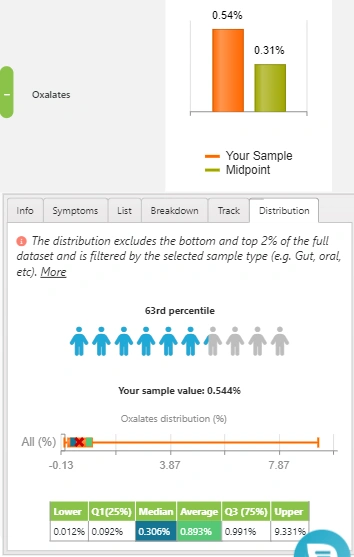
Spotlight on Bifidobacteria
What are Bifidobacteria?
Bifidobacteria are probiotics, meaning that they are friendly bacteria that can be boosted via direct ingestion through supplements or consumption of foods containing them or provide energy sources for them. In general, it has been found that having these probiotics in the correct quantity has been linked to numerous health benefits, including the following: prevention of bowel diseases such as diarrhoea, stave off harmful bacteria, improved immune system functionality, weight loss and improved digestion, alleviating postmenopausal disorders, healthier skin, and modulating the gut-brain axis as a novel therapeutic solution for mental health problems. As this is the case, it is vital to have a diet that benefits these probiotics to stay healthy.
Benefits of Bifidobacteria
Despite typically comprising less than 10% of the total microbiota, this genus plays a prominent role in maintaining gut health. An example of a benefit that Bifidobacteria provide is the breakdown of fibre and other complex carbohydrates that our body would not normally be able to digest on its own. These food items are primarily referred to as prebiotics, which are fibres used to feed probiotics directly. Breaking down these fibres and complex carbohydrates causes the release of products such as short-chain fatty acids (SCFAs) that Bifidobacteria itself can use, as well as surrounding microorganisms. This means that Bifidobacteria, albeit in small quantities compared to other bacteria present in the microbiome, are key in creating an environment in which other microorganisms can thrive. It should be noted that through this method, probiotics like Bifidobacteria are the reason why digesting fibre has been found to cause weight loss and reduce the risk of heart disease, diabetes, and other chronic disorders.
Findings specific to Bifidobacteria?
Acetate, one of the SCFAs produced by Bifidobacteria when degrading fibres, prevents infection from toxins produced by E. coli by inhibiting the transport of these toxins from the gut to the blood. This is why this genus is particularly important in newborns since they are some of the first to grow in their intestines and comprise up to 60% of the microbiome, much larger than the 10% present in adults. It is vital that these are in high quantities after birth since they are able to digest the sugars found in breast milk that will be used for growth. However, to achieve this result, standard vaginal delivery and breast milk are encouraged to have more Bifidobacteria in their microbiome. In the same vein, as Bifidobacteria are core for establishing an environment in which other bacteria thrive, this genus is able to help restore intestinal bacteria after treatments such as chemotherapy or illnesses.
It has been found that people suffering from obesity, diabetes, celiac disease, dermatitis, and allergic asthma have lower levels of Bifidobacteria in their microbiome compared to healthy individuals. Additionally, having higher levels of Bifidobacteria has been found to improve BMI significantly, reduce cholesterol, combat cancer, and reduce symptoms of IBS, inflammatory bowel disease, ulcerative colitis, chronic fatigue syndrome, and psoriasis. Additionally, it has also been shown that, when combined with other probiotics, Bifidobacteria reduced symptoms of anxiety and depression by reducing psychological distress and negative thoughts.
Additionally, Bifidobacteria help degrade oxalates, which are hard to avoid organic compounds found in vegetables, fruits, nuts, or just naturally produced by the human body itself. These oxalates are usually expelled in the stool or urine but can sometimes remain in the colon and urinary tract for sensitive individuals or those with high-oxalate diets. It is essential that Bifidobacteria degrade oxalates since if the oxalates are not degraded, they can bind to minerals, which prevent absorption. Oxalates may also contribute to kidney stones. At Biomesight, this is something we track in our intolerances section found here. And, as you can see from my results, while my oxalate degraders are higher than the midpoint of Biomesight users, it is below average and on the low side compared to the overall distribution and i therefore need to focus on increasing my oxalate degraders.
Furthermore, certain individuals may have lower expression of the gene FUT2, which encodes for an enzyme involved in producing antigens found on the surface of red blood cells of people with the ABO blood type. This antigen is normally secreted into bodily fluids such as saliva, mucus, and tears. Those with this gene expressed at normal levels are called “secretors”, and those with lower expression levels are called “non-secretors.” While it is unclear whether secretors or non-secretors are healthier, it is certain that secretors have a higher bifidobacterial diversity, richness, and abundance than non-secretors. As this is the case, non-secretors will have to dedicate more of their diet to feeding the low numbers of Bifidobacteria they possess or increasing the expression of FUT2. One such substance that increases the expression of FUT2 is Genistein, which can be found in a number of plants, with this substance being prominently found in soybeans and soy products such as tofu.
How to increase Bifidobacteria levels?
Fortunately, to reap the many benefits of Bifidobacteria, there exists a variety of methods to increase the levels of this genus in your gut:
- Eating high fibre foods and prebiotics since these are likely to be utilised by Bifidobacteria for energy as our body is unable to degrade them
- Some examples of high fibre foods include apples, almonds, and oats
- Some examples of prebiotics include onions, garlic, and legumes
- Eating fermented foods which contain healthy bacteria such as Bifidobacteria
- These could be yoghurts, sauerkraut, and kimchi
- Eating polyphenols that the gut bacteria can break down
- Notable examples of these are red wine, tea, and dark chocolate
- Exercise can increase the abundance of health-promoting bacteria such as Bifidobacteria
While you can increase your Bifidobacteria levels by eating foods containing fibres and complex carbohydrates to feed them, you can also take a much more direct approach of purchasing supplements. Taking these is likely to be safe for most people, but caution should be advised for those with compromised immune systems or health issues.
Fortunately, here at Biomesight, we offer these recommendations on our website. We have been tracking 30 different Bifidobacteria species, these comprising a median of 0.329% of all the microbiota we track in the average user. The most prominent species found within the Bifidobacteria genus are B. longum, B. bifidum, B. adolescentis, with a median of 0.123%, 0.055%, and 0.054% respectively. Since the median of BIfidobacteria found for all users is on the lower side, it seems that we all need to follow the advice here in this article to try to reach the amber and green ranges on Biomesight! Looking in the advanced view, I can see that even though I myself have higher than median presence of 0.541% Bifidobacteria, this is still below the optimal range! Biomesight provides me with recommendations of prebiotics and foods, which coincide with the food recommendations written above in this blog article so I can work on getting my Bifidobacteria into the optimal range.

